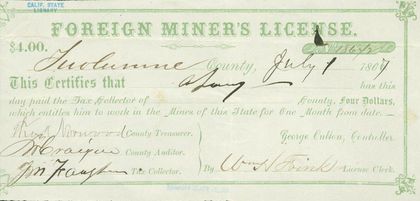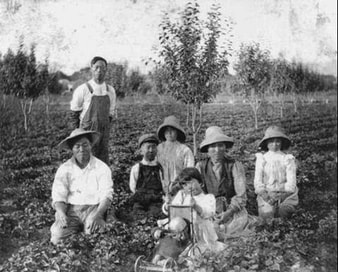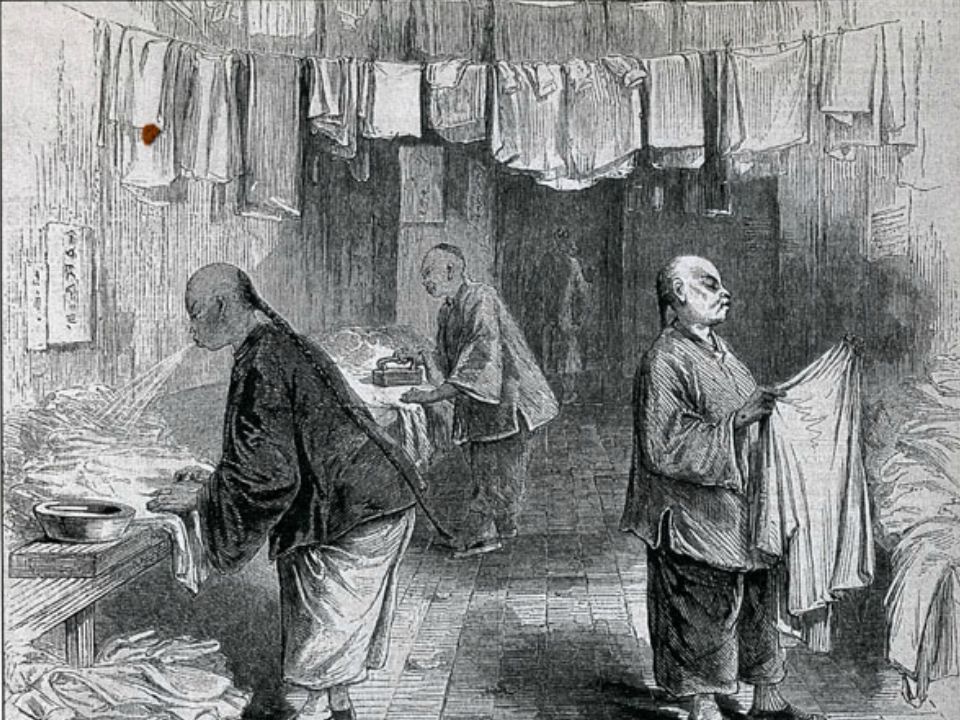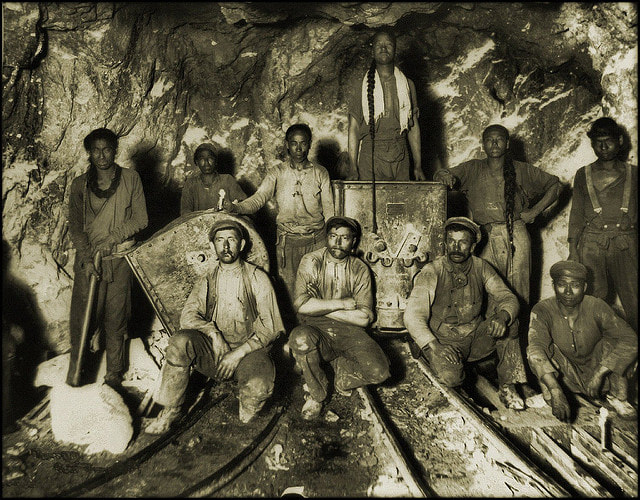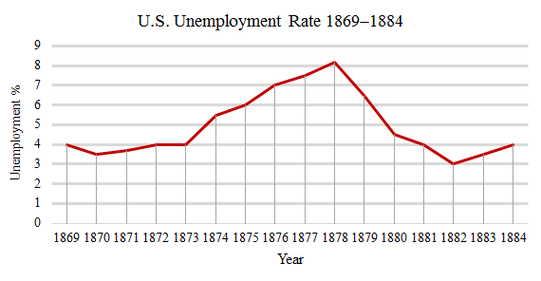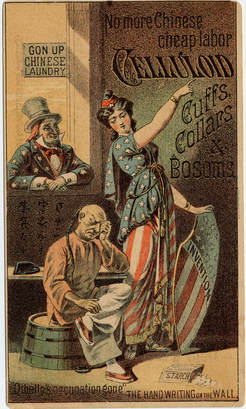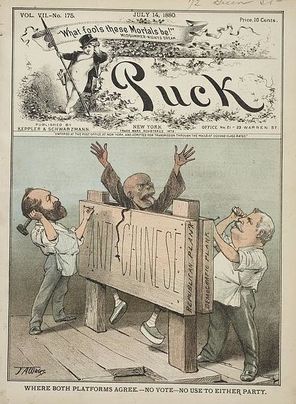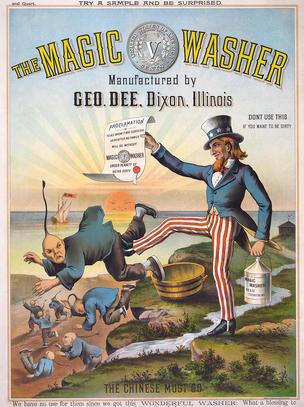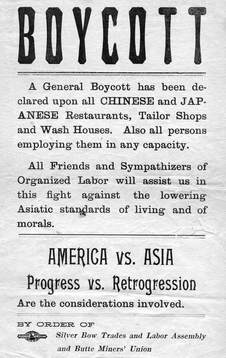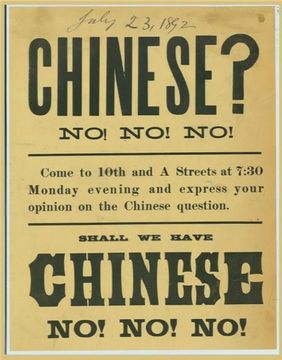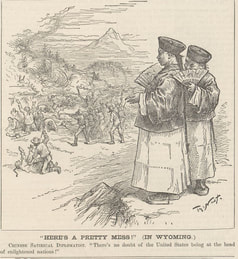Economic conflicts involving competition for employment opportunities fueled resentment between Chinese and white laborers.
|
As gold grew scarce, the presence of Chinese laborers caused tension. In 1850, the California legislature enacted the Foreign Miners Tax, which levied a monthly $20 tax on each foreign miner and deliberately targeted the Chinese.
"This tax was the opening act in a campaign by white Americans to restrict the entry of Chinese laborers into California to compete with them for jobs and wages. It compelled many Chinese to stop prospecting for gold."
-Eric Fong ("Immigration, Ethnicity, and Conflict: The California Chinese") |
Following the end of the Gold Rush and the completion of the Transcontinental Railroad in 1869, the unemployment rate skyrocketed. In response, Chinese laborers became willing to work in terrible conditions for longer hours and lower wages. This made them desirable to hire and allowed them to find jobs in agriculture, mining, and laundry. By 1870, Chinese immigrants comprised 25% of the workforce in California.
"It has been industrious Chinese labor that has cleared up farms, that has planted fruit trees, that has opened our mines, that has built cities..."
-Charles Stuart, delegate to the California Constitutional Convention, 1878 ("Speech to the Convention")
-Charles Stuart, delegate to the California Constitutional Convention, 1878 ("Speech to the Convention")
Faced by a sudden wave of joblessness, white laborers feared that Chinese immigrants were stealing jobs and lowering the standard of living for the entire working class.
|
"In reality, the staggering unemployment was a result of an economic recession and the presence of the Chinese posed no threat. They had been made the scapegoats."
-Representative Judy Chu (C-SPAN) |
"Racism is always there underneath, but usually it is exploited in these times of economic crisis."
-Iris Chang (The Chinese in America) |
"We were accused of unfair competition in business, of lowering wages with cheap labor, of being racially inferior. But this could not be more untrue. We were hard workers and we meant no harm."
-Cheng Ti Sui, 1877 ("Across Generations: Immigrant Voices")
-Cheng Ti Sui, 1877 ("Across Generations: Immigrant Voices")
|
|
Various groups utilized media to encourage the idea that Chinese immigrants threatened the economy.
The Workingmen's Party of California, a labor-based political union, rose to fame for its anti-Chinese agenda. They added a provision to the California constitution that prohibited Chinese employment in the government.
"The father of a family is met by them [Chinese workers] at every turn. Would he get work for himself? Ah! A stout Chinaman does it cheaper. Will he get a place for his oldest boy? He cannot. His girl? Why, the Chinaman is in her place too! Every door is closed. He can only go to crime or suicide, his wife and daughter to prostitution, and his boys to hoodlumism and the penitentiary."
-Denis Kearney, President of the Workingmen's Party of California, 1878 ("Our Misery and Despair") |
Businesses and politicians promoted anti-Chinese messages to appeal to the public and create a nativist feeling against immigrant labor.
"The effect of the presence of this persistent race upon the more impressible American should be considered. In California, the white farm laborer who is forced into competition with them... must roam in search of other employment."
-Senator John Miller, 1882 ("An Earnest Appeal to Congress")
-Senator John Miller, 1882 ("An Earnest Appeal to Congress")
The resulting sentiment against immigrant labor started boycotts, protests, and riots.
|
"Every Chinaman doing this work takes bread from the mouths of our women... Our motto should be: Our country, our people, and our native land."
-Knights of Labor, 1878 ("China's Menace to the World") "If the labor situation does not improve, bullets will replace ballots."
-Denis Kearney, 1878 ("Our Misery and Despair") |
In some cases, such as the 1885 Rock Springs Massacre in Wyoming, riots grew violent.
|
"The Chinese and white miners had a dispute over who had the right to work in a desirable area of the mine. That evening the white miners, armed with rifles, rioted and burned down the Chinese quarter. No whites were prosecuted for the murder of twenty-eight Chinese and $150,000 in property damage."
-"History Matters" (George Mason University Library) |
"Gentlemen, I find the law very explicit on murdering your fellow man, but there's nothing here about killing a Chinaman.
Case dismissed." -Judge Roy Bean, 1880 (Archive) |
